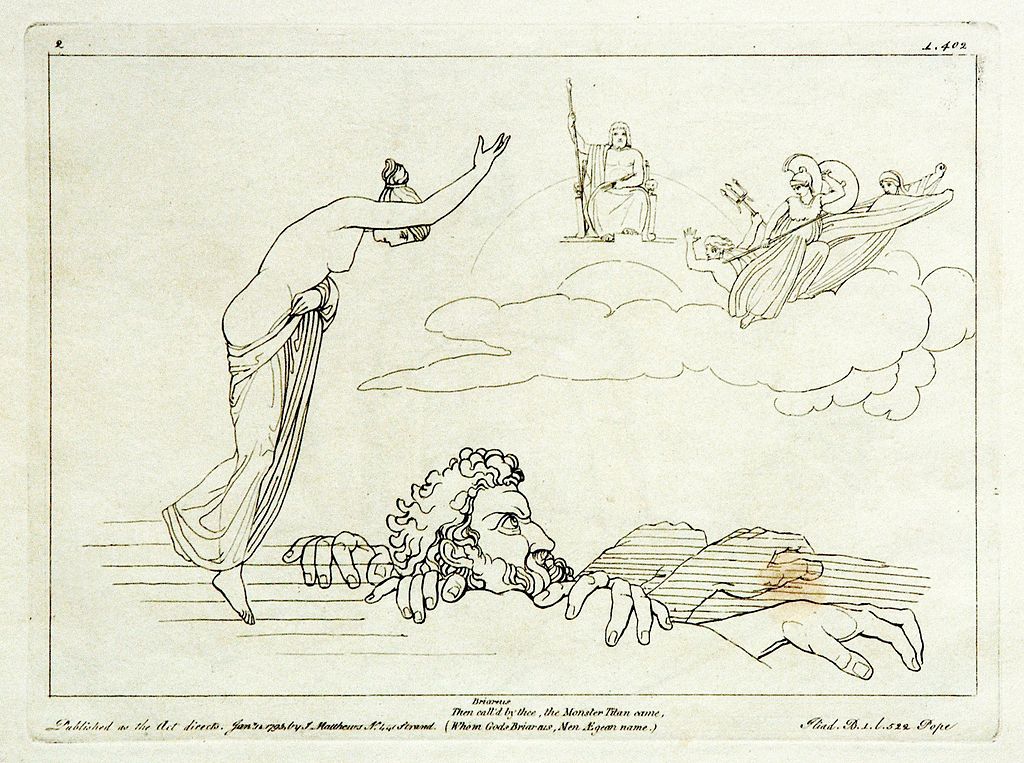BRIAREUS IN GREEK MYTHOLOGY
Briareus in Greek Mythology
Briareus was one of the three Hecatonchires spoken of in Greek mythology. A son of Ouranos and Gaia, Briareus would be known as an ally of Zeus.
The Hecatonchire Briareus
There were three Hecatonchires, commonly said to have been born to Ouranos (Sky) and Gaia (Earth); these three Hecatonchires were named as Cottus, Gyes and Briareus, each perceived to be the personification of storm winds.
Homer tells of how Briareus was also known as Aegaeon, for Briareus was the name by which the gods called him, whilst Aegaeon was the name given to him by mortals.
Homer, in the Iliad, also gives Briareus different parentage to most ancient sources, calling Briareus a son of Aegaeus, the god of storm winds.
Homer tells of how Briareus was also known as Aegaeon, for Briareus was the name by which the gods called him, whilst Aegaeon was the name given to him by mortals.
Homer, in the Iliad, also gives Briareus different parentage to most ancient sources, calling Briareus a son of Aegaeus, the god of storm winds.
The Prisoner BriareusAt the time of the birth of Briareus and his brothers, Ouranos was the supreme god of the cosmos, but he was afraid of Briareus and his brothers. The Hecatonchires were described as having 100 arms, 50 heads and gigantic statures.
Fearful that he might be overthrown, Ouranos imprisoned the Hecatonchires and the Cyclopes into Tartarus. |
|
This imprisonment, was one of the reasons why Gaia incited the Titans to revolt against Ouranos, their father, but once Cronus had became supreme deity, he did not release Briareus and his siblings, for he too was wary of their power.
Briareus and the Titanomachy
It was left to Zeus to release Briareus and his brothers from Tartarus, killing Campe, the dragon guarding them in the process.
Briareus and the other Hecatonchires then aided Zeus and the other Olympians in the Titanomachy, fighting alongside Zeus. The strength of Briareus was such that hundreds of boulders could be launched at the Titans in one volley.
The Titans were of course overthrown, and Zeus became the supreme god, and Zeus decided to reward his allies.
Each of the three Hecatonchires was given their own palace beneath the waves; those of Cottus and Ggyes were in the realm of Oceanus, whilst Briareus was beneath the Aegean.
Poseidon also gave to Briareus his own daughter, Cymopolea (Wave ranging), to become Briareus’ wife, as a reward for the Hecatonchire’s bravery during the Titanomachy.
Briareus and the other Hecatonchires then aided Zeus and the other Olympians in the Titanomachy, fighting alongside Zeus. The strength of Briareus was such that hundreds of boulders could be launched at the Titans in one volley.
The Titans were of course overthrown, and Zeus became the supreme god, and Zeus decided to reward his allies.
Each of the three Hecatonchires was given their own palace beneath the waves; those of Cottus and Ggyes were in the realm of Oceanus, whilst Briareus was beneath the Aegean.
Poseidon also gave to Briareus his own daughter, Cymopolea (Wave ranging), to become Briareus’ wife, as a reward for the Hecatonchire’s bravery during the Titanomachy.
Other Tales of BriareusAfter the Titanomachy, the Hecatonchires were said to be the guards of Tartarus, prisoners having become prison guards, but Briareus also appears in two specific tales.
Briareus would act as arbitrator when an argument arose between Helios and Poseidon about which deity would be worshipped in Corinth. Briareus would decide that the low areas of Corinth, the Isthmus of Corinth, would be Poseidon’s, whilst the higher areas around the Acrocorinth was to be Helios’. The Naiad Thetis would call upon Briareus when she discovered a plot planned by Poseidon, Athena and Hera against Zeus. Briareus came from his Aegean palace to stand alongside Zeus’ throne upon Mount Olympus. The presence of Briareus was sufficient to dissuade the plotters from action. Some writers in antiquity also talk of Briareus being an enemy of Zeus and an ally of the Titans, but the most likely explanation for this was the confusion between Briareus as Aegaeon with Aegaeus, who had been an ally of the Titans. |
|
|
|
Colin Quartermain - Briareus - 2nd March 2020
